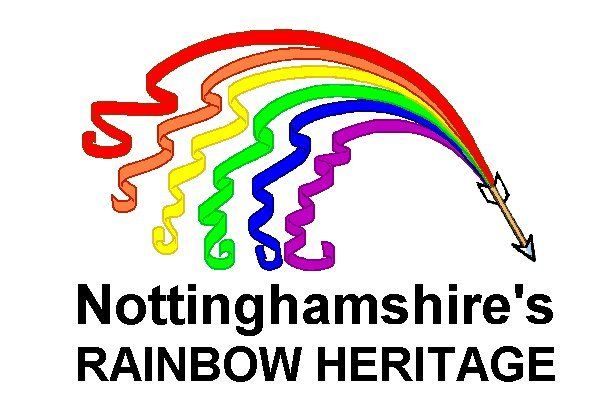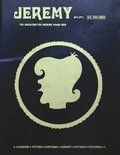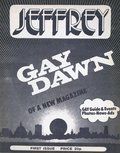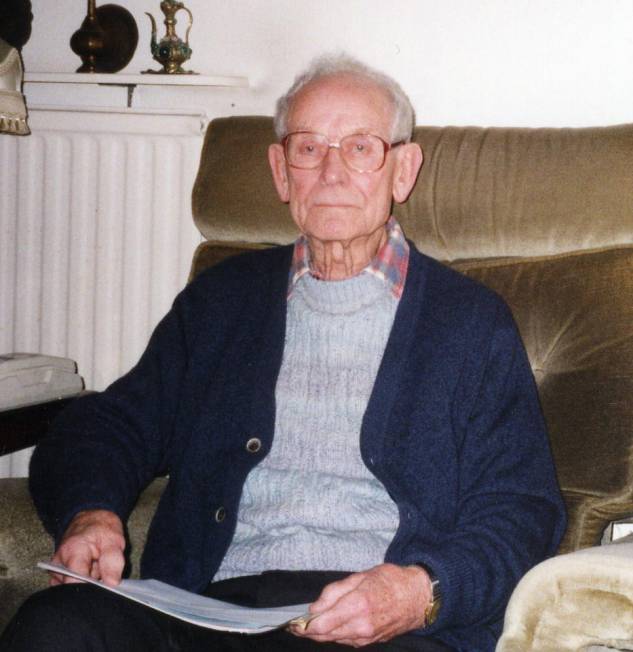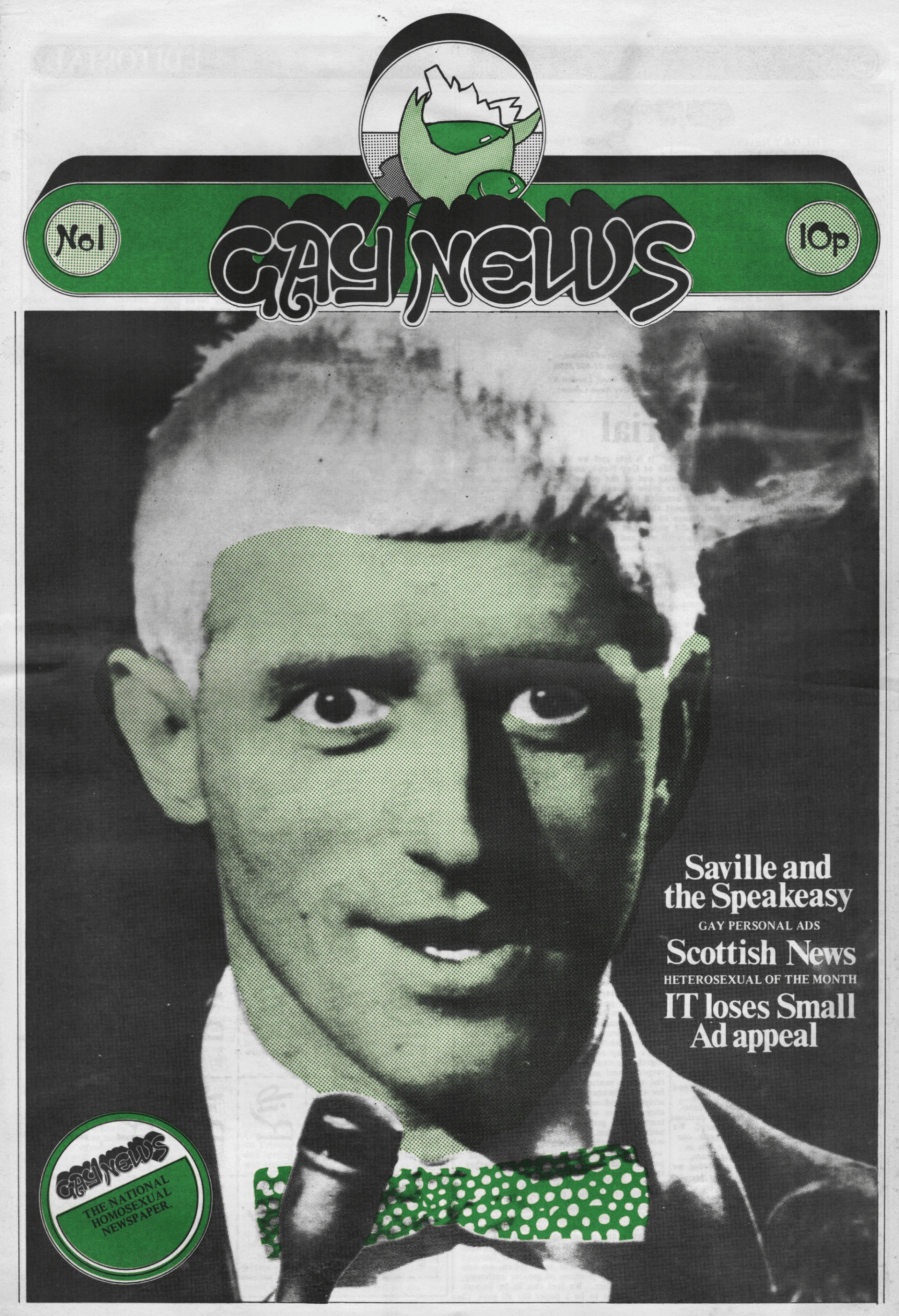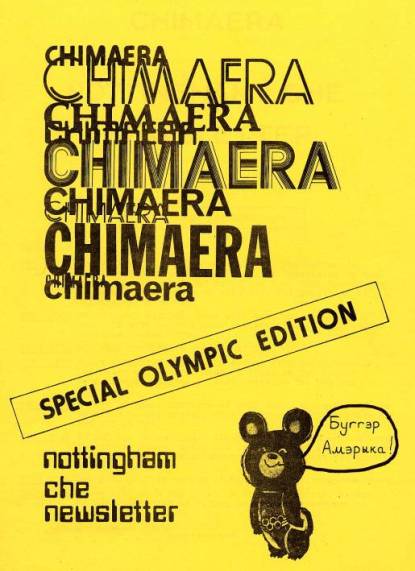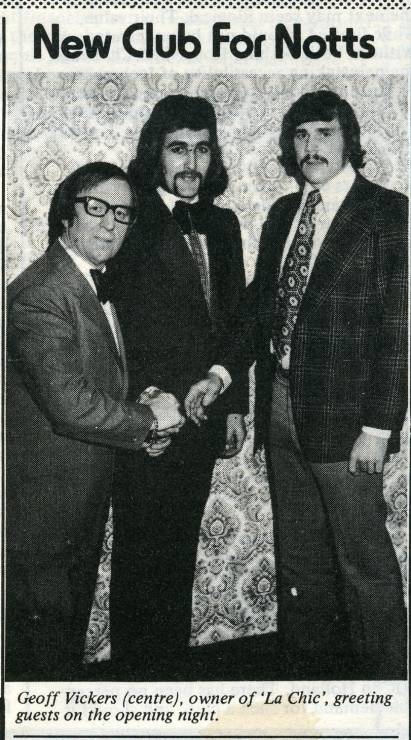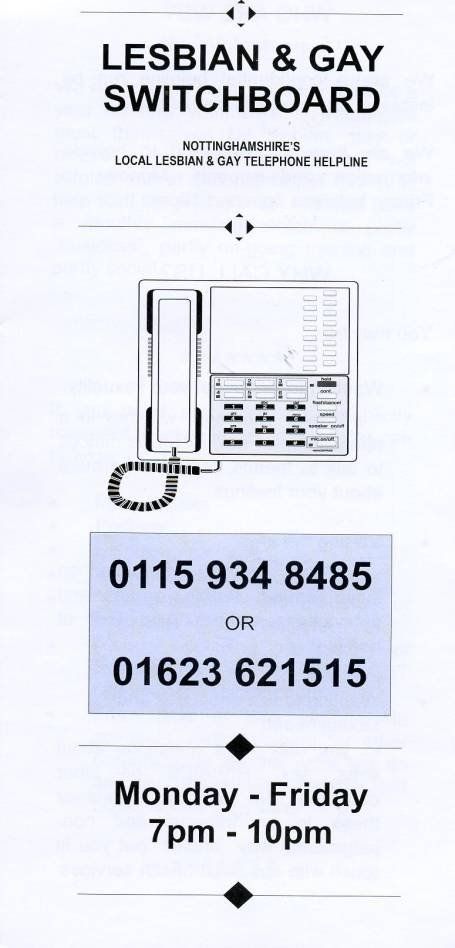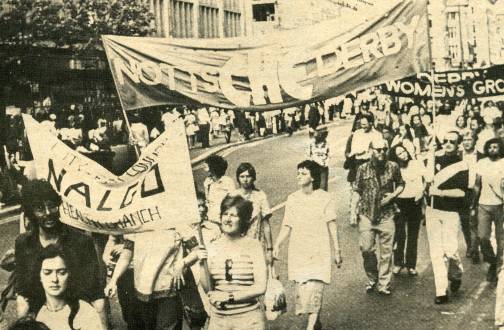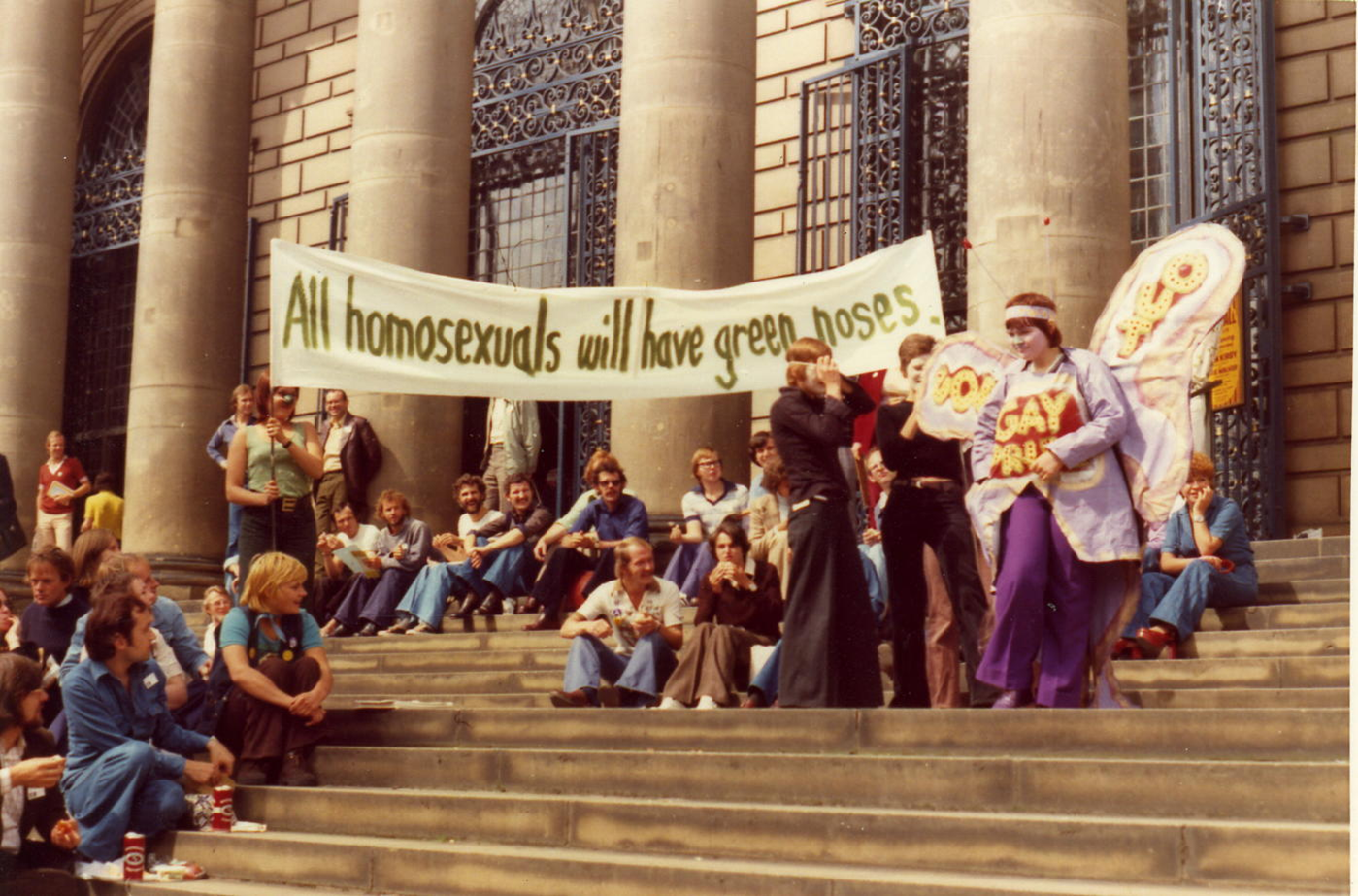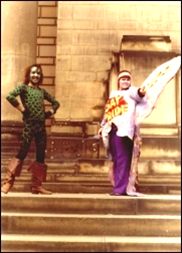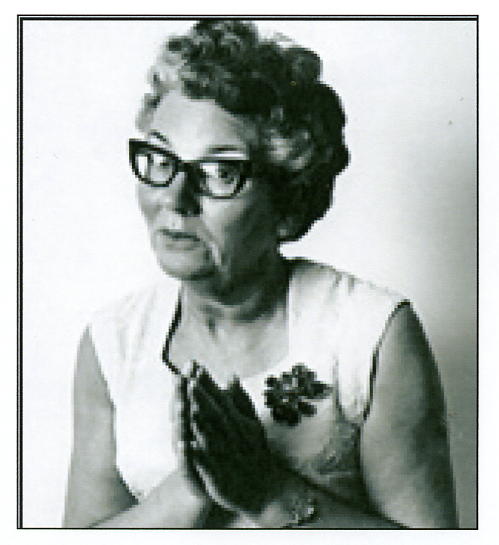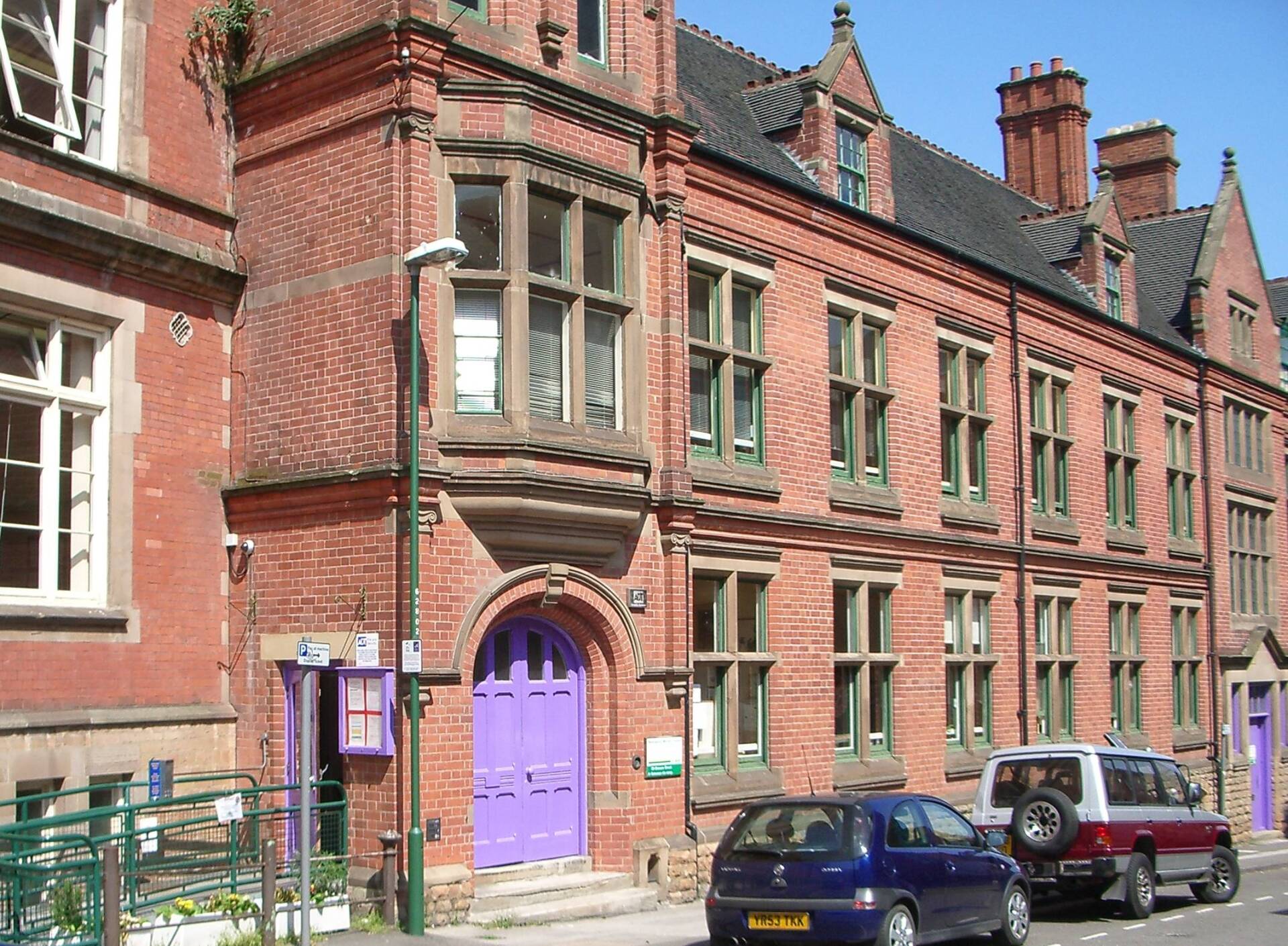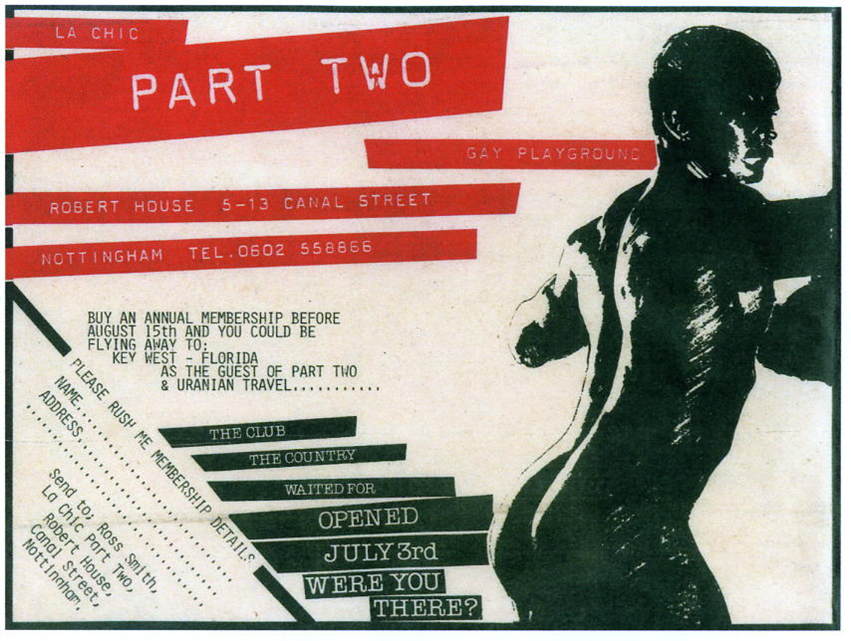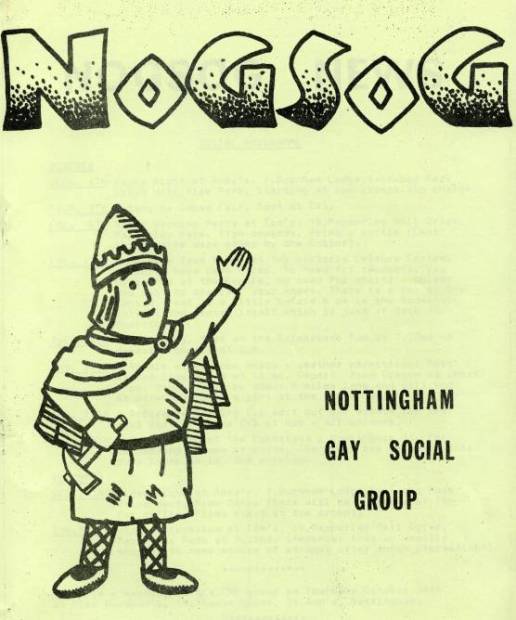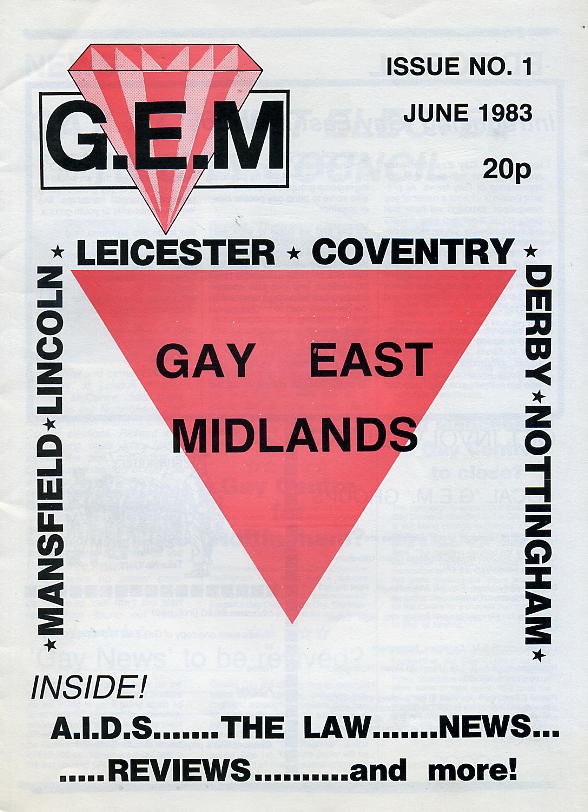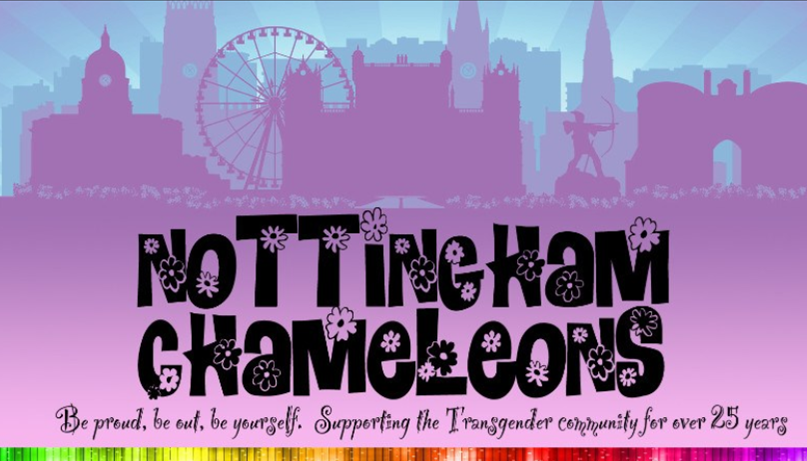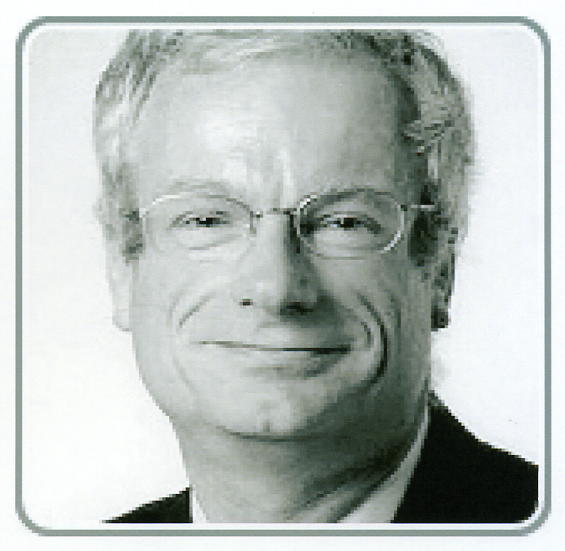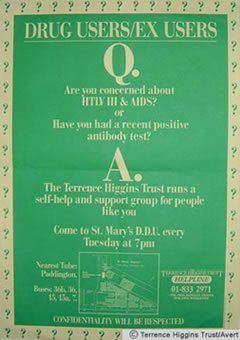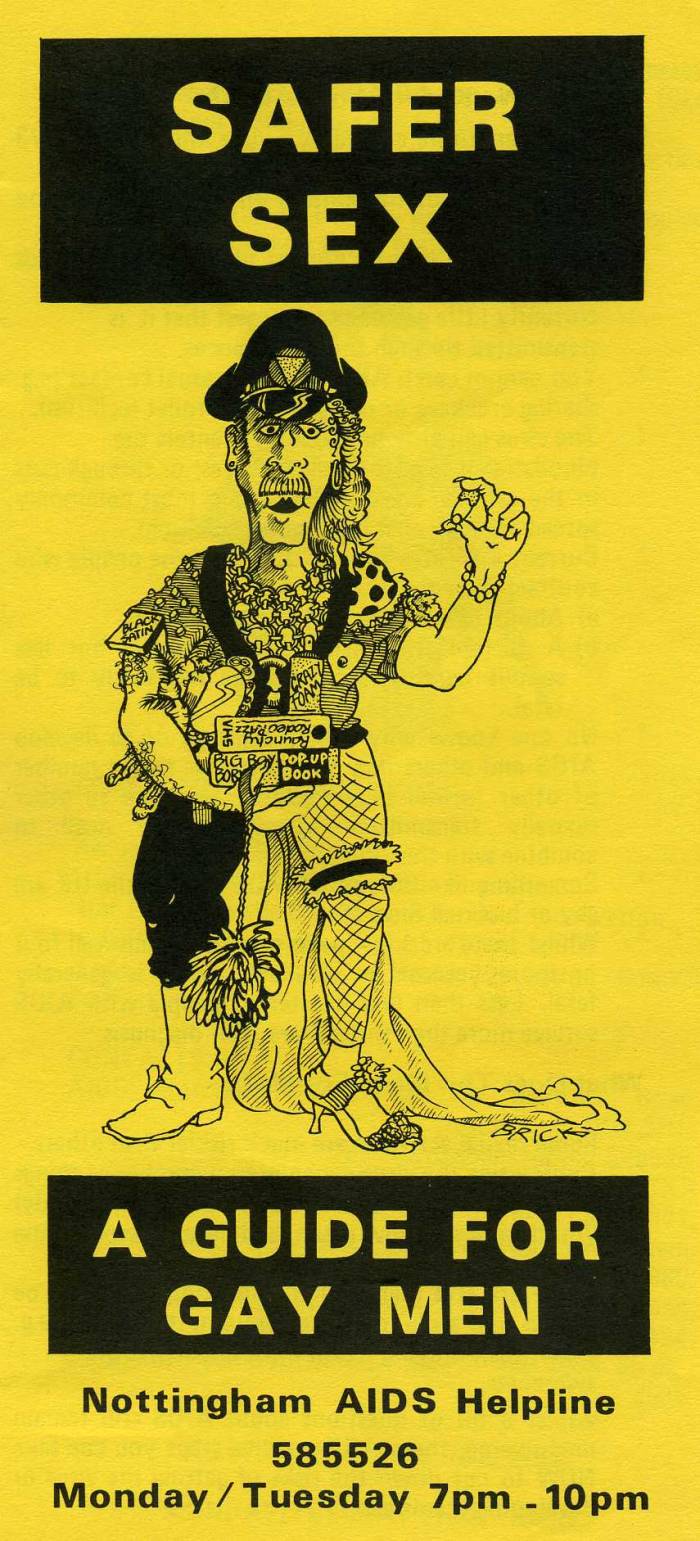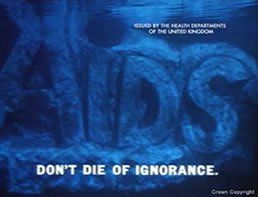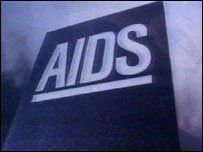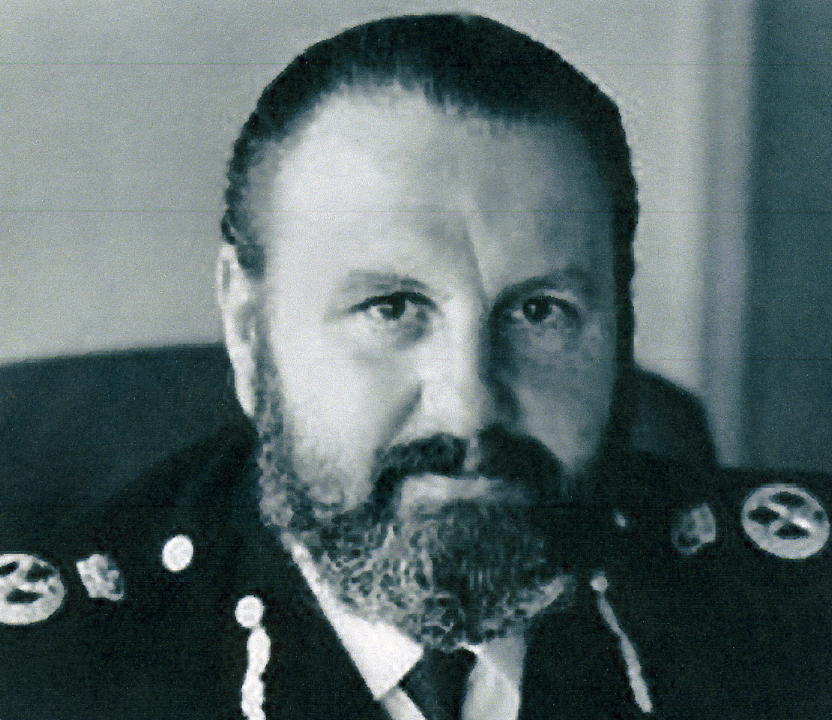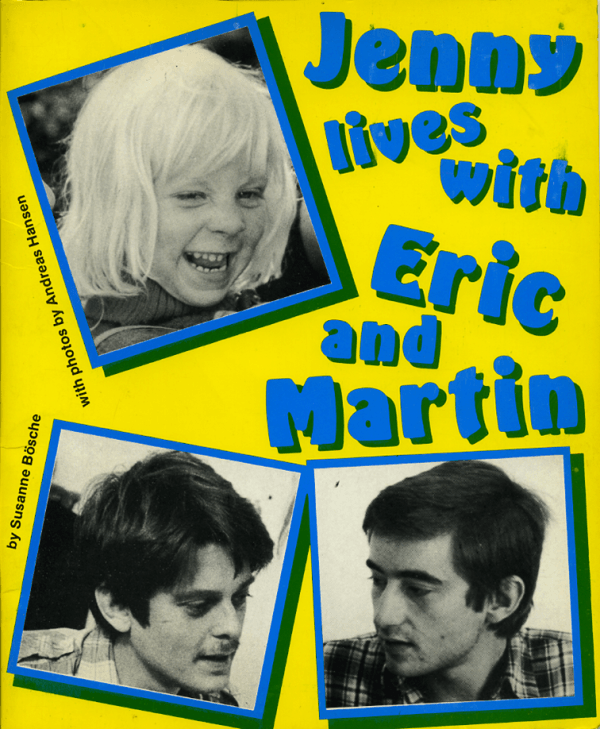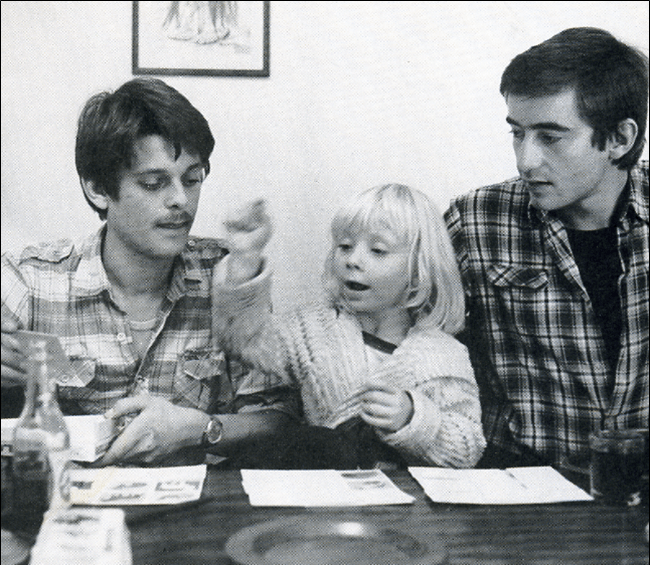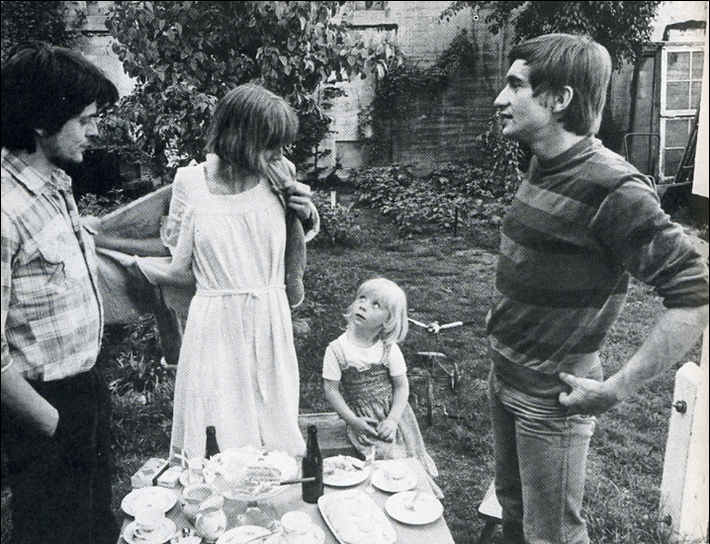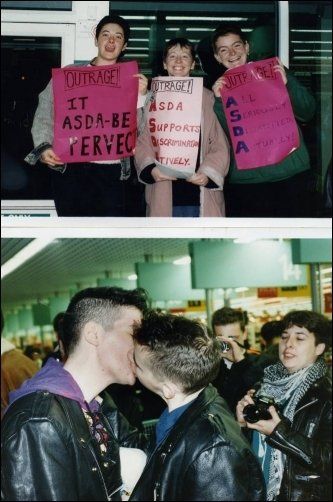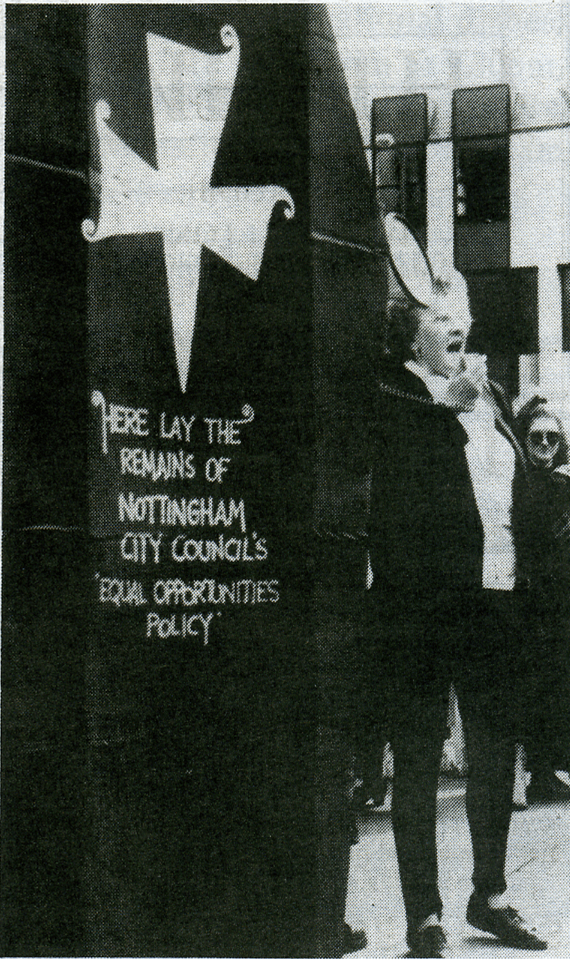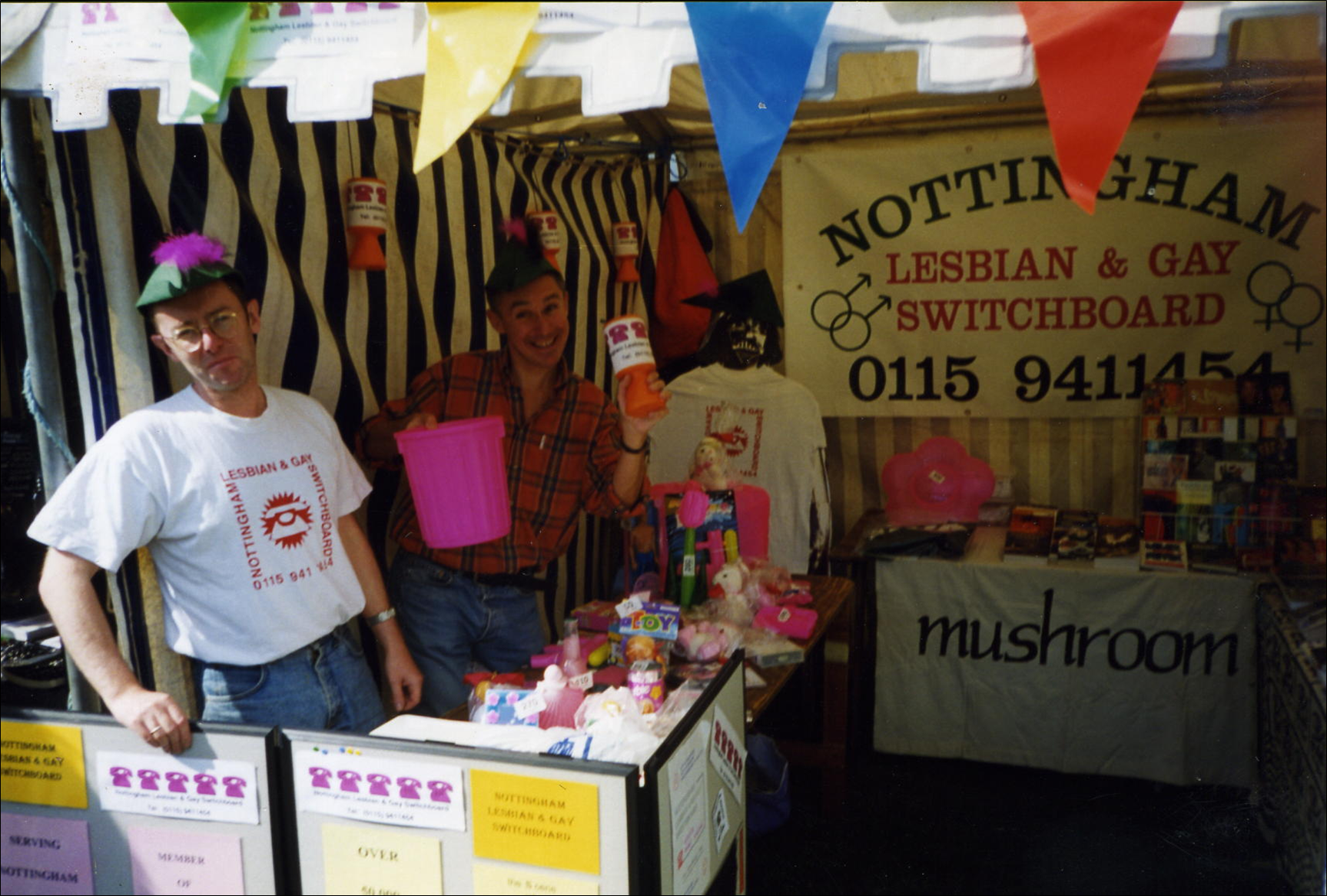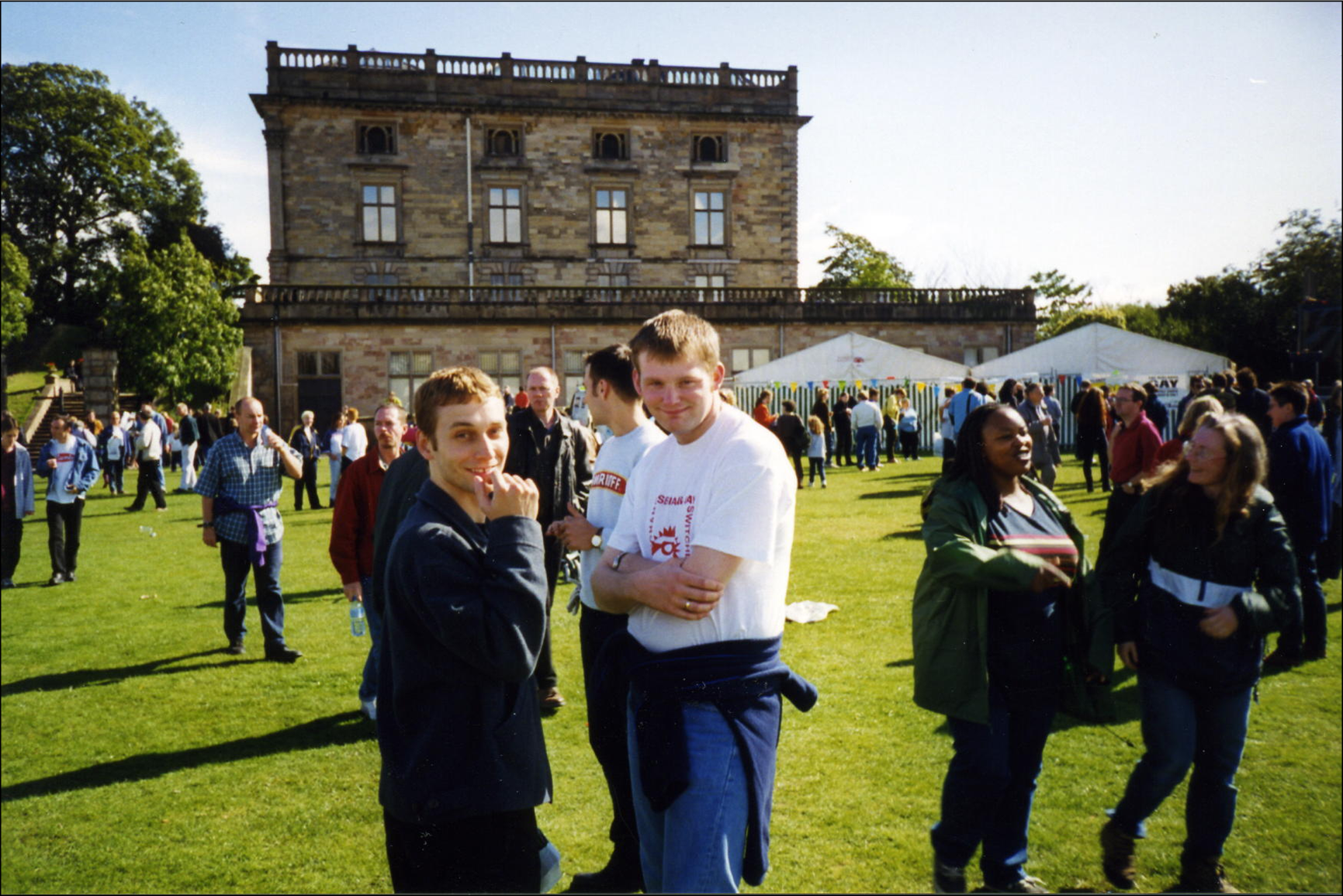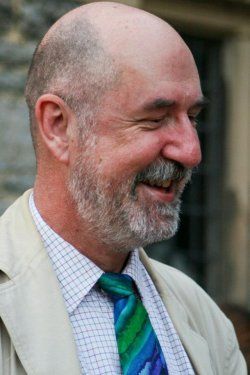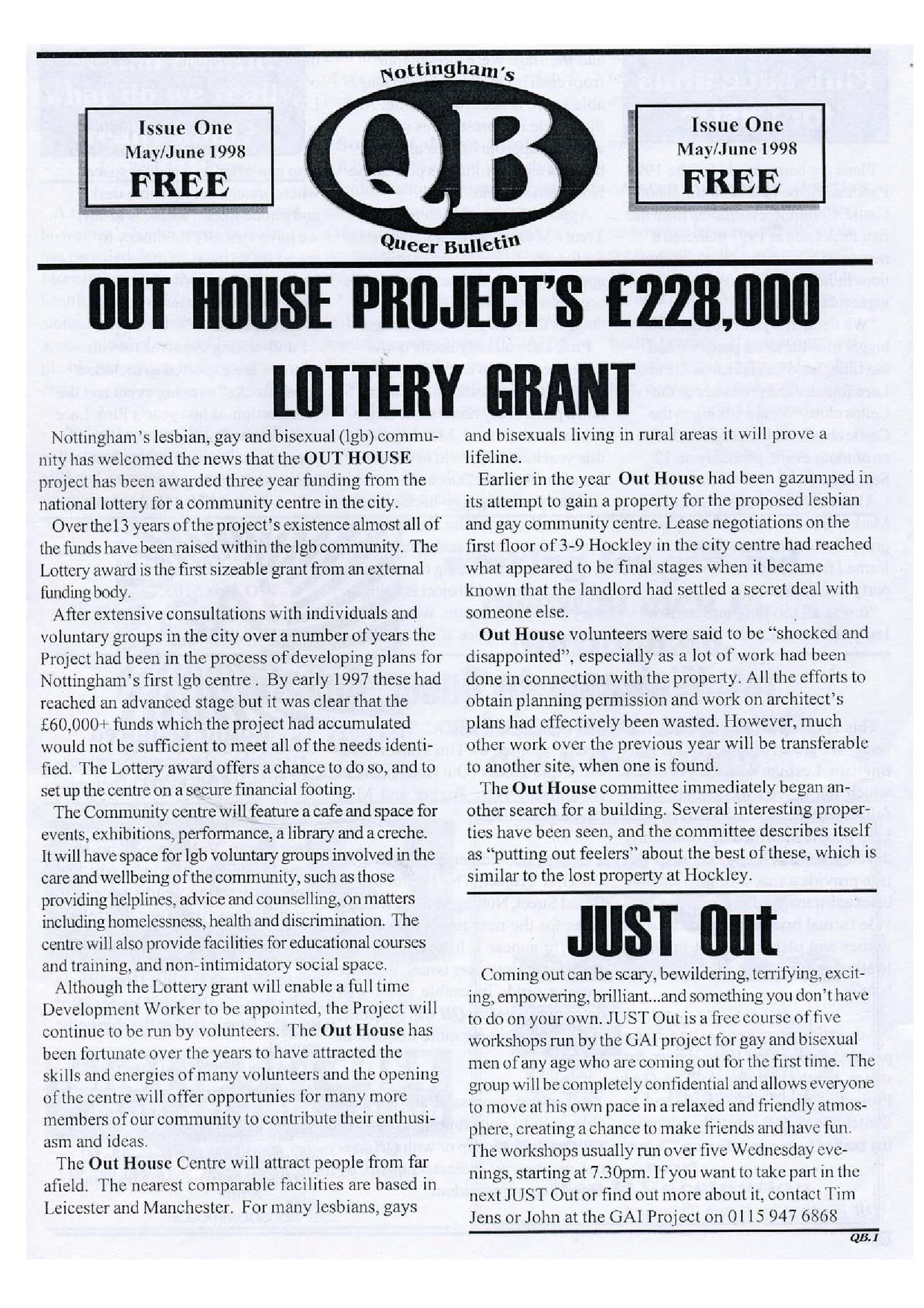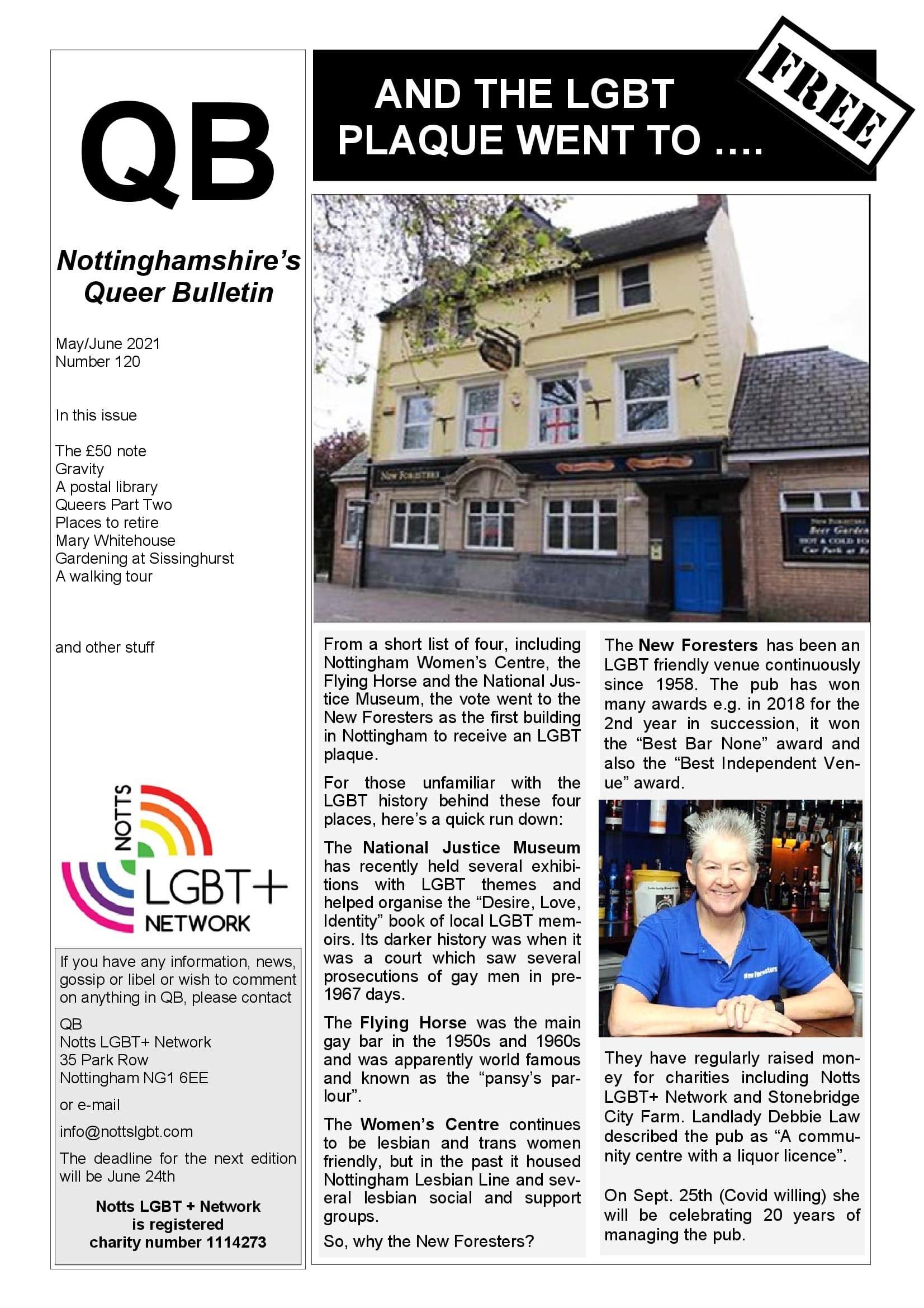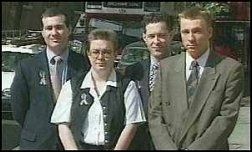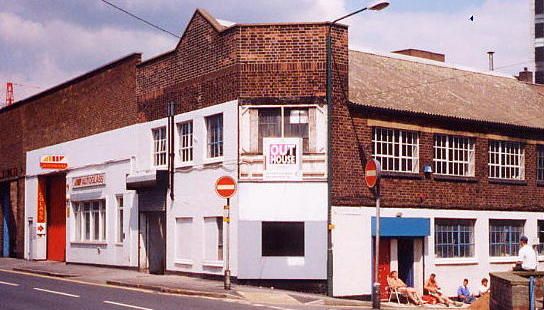1960s
1970s
Though the 1967 Act was to be welcomed, it had many anomalies and left many gaps. Campaigning groups were set up to try to improve the situation.
The two main groups were CHE (the Campaign for Homosexual Equality) and GLF (the Gay Liberation Front)..
The picture shows Ike Cowen in 2000, aged 82. In the late 1960s Ike was in touch with the national CHE and hoped to establish a CHE group in Nottingham.
When sufficient people had contacted CHE to make a local group viable, Ike organised the first meeting on November 16th 1971. In March 1972, a small committee was set up to keep the group running and a series of meetings began.
To find out more about Nottingham CHE 1971-1982, click HERE
In addition to the campaigning/activist groups, there were three further strands which, in the 1970s, led to a growing improvement in facilities and support for lesbians and gay men were
- The establishment of legitimate meeting places
- A network of support services and helplines
- Community newspapers and magazines
The first and most important national gay newspaper was Gay News, which started publication in 1972.
The front page of the first edition unfortunately, to modern eyes, bears the picture of Jimmy Savile.
Starting in 1972 Nottingham CHE published its own newsletter, Chimaera - which continued until 1982.
It was circulated to about 150 people who were either CHE members or wanted information about CHE. Chimaera was often quite substantial - one edition ran to 28 pages.
CHE was unconcerned about this as all the paper and duplicating facilities were "obtained" from local schools and companies by their CHE members.
In 1974 the Times Literary Supplement had an article on the publications of various voluntary groups. Chimaera was the only gay-related publication to be mentioned.
"The granting of a licence for La Chic club is a disgrace. What effect this will have on young people, I dread to think".
"I realise that this "gay, unhappy breed" are in need of help, but why choose our city?"
"The promoters will succeed in making the "Queen of the Midlands into a laughing stock".
Just some of the letters from the Nottingham Evening Post in 1973, which followed their article (see photo to the right) announcing the opening of the club To read more click HERE.
La Chic was not the first gay club in Nottingham. It WAS the first gay club in the UK which had a licence saying it was specifically for gay men and lesbians.
A Forum “Homosexuals as People” was held at La Chic on Saturday November 6th, 1976. It was directed towards people in “the caring professions”. 125 people took part and the audience was made up of people from Social Services, Probation, Marriage Guidance, Samaritans, Student Organisations, NCVS and the Clergy.
Nottingham CHE got many contacts from people who had no interest in campaigning, but did have various "issues". The CHE committee decided to start a support service which turned into Nottingham Gay Switchboard - copying the "Switchboard" bit from the London service.
It later became Nottingham & Nottinghamshire Lesbian & Gay Switchboard and is now Notts LGBT+ Network. It includes a helpline providing information and support by phone, letter, e-mail, texting and instant messaging. It has had over 70,000 contacts since it started. But when did it start?
Switchboard/Network has 3 starting dates.
In 1974 it began as a drop-in advice night at the Nottingham People's Centre.
In 1975, it moved next door to the Council for Voluntary Service and acquired a phone line.
In 1976, it started calling itself a "Switchboard" following the example of London's service.
This is quite useful, as it allows Switchboard to have major anniversary celebrations on three consecutive years.
Unlike many of the similar helplines set up in the 70s and 80s a) it has no paid workers and b) it's still going.
To go to the Network's website, click HERE
To read the 2000/2006 book centred around Switchboard, click HERE
To read the Network's 40th anniversary booklet Click
HERE
In 1976 Nottingham CHE and GLF got together to form the Gay Activist's Alliance. Together they produced two examples of gay street theatre. The main instigators of Nottingham's gay street theatre were Kris Kirk and Howard Wakeling. Afterwards, Howard wrote several scripts which were broadcast on the BBC. Kris wrote a book on drag and later wrote for Gay Times.
The first was a twist on the Robin Hood story "Robina Hood and her gayfolk". This was performed in the Market Square. The performers were chased out of the square when a Russian delegation emerged from a reception in the Council House. Heather Cook played the part of the Major Oak Tree. She relates that her costume was so effective that a dog peed up her leg.
The second. seen here performed on the steps of Sheffield Town Hall, was called "Green Noses". The assumption behind the play was that suddenly everyone who was gay or lesbian had their nose turn green overnight - so everyone was immediately outed ... with interesting consequences.
The picture on the right shows Kris Kirk as the devil and Carole Taylor as the magnificent Gay Pride butterfly. Howard Hyman played the part of an ordinary "dad" while Derek Johnson, who was a high-powered businessman played the part of a high-powered businessman, including bowler hat.
Mrs Mary Whitehouse, anti-porn campaigner and Dame Edna Everage lookalike, revived the crime of Blasphemous Libel (last used in the 1920s) to prosecute Gay News over a poem which they had published.
The trial took place in 1977.
Editor Denis Lemon was given a nine-month suspended jail sentence and a £500 fine. Gay News was fined £1,000. The paper reckoned that the trial brought it publicity worth millions and introduced the paper to many who had never previously seen it.
1980s
Called "Part Two" because it revived a gay club in the premises used by La Chic (1973-77), it too produced articles in the Evening Post. To read them, click HERE
There was nothing like the hysteria of 1973 - one apparently outraged lady was actually a CHE member who hoped to start a chain of correspondence. The main opposition was from the management of Whispers club. They said the city could not support two clubs. They were right - farewell Whispers. To read about the Part Two story click HERE
In 1982 CHE decided to become a campaigning only organisation. The decision weakened it locally and nationally. Most members immediately jumped ship and in Nottingham they headed for NOGSOG, an inelegant acronym which stood for Nottingham Gay Social Group.
NOGSOG was set up to take over the social role of CHE and did so successfully for several years.
The effect on Switchboard was that it was now totally independent of CHE and had to become self-financing. A benefit at Part II and profits from sales of Gay News helped.
In 1977 Nottingham Switchboard tried to advertise in Nottingham Evening Post. The ads were banned. To read the letter relating to this from its managing director, click HERE. In 1982, Switchboard was surprised when the Evening Post finally agreed to take advertisements.
The first widely distributed lesbian and/or gay magazine which came from this area was GEM - Gay East Midlands.
It was set up by volunteers in Nottingham at the time when the national newspaper Gay News was starting to fail.
When Gay News folded in 1983, there was no national publication to take its place immediately. For that reason, GEM suddenly acquired a much wider audience than it expected and was in demand across the country.
Transgender people do not necessarily have anything in common with lesbians, gay men and bisexuals. Nevertheless, in the 1970s several trans people contacted Nottingham Switchboard to ask where they could meet others. The answer was "There's nothing in this area". Telephone volunteer Mick Banbury encouraged these callers to keep in touch by phone and told them that when there were enough people interested, he would organise a meeting for them. This took place and the meetings continued, eventually carrying on under their own control. In 1983 this Nottingham trans group found its own premises and named itself the Chameleon Group - it's still going
In Rugby, the Tory Council said “In future any homosexuals will not be employed by the Council. They may be the best applicant, but they will not get the job”.
This led in 1984 to a large demonstration at which various people spoke in opposition to the Council. One speaker was Chris Smith MP. He "outed" himself during the speech - the first MP to come out voluntarily.
He said "I'm gay and there are about 100 others in the House of Commons, but they won't tell you."
People began to be aware of AIDS in the early 1980s, but at first its nature and method of transmission were puzzling, which led to many scare stories about how you could be infected.
In 1985 Body Positive was set up as the first UK self-help group for people affected by HIV and AIDS.
In Nottingham, the Nottingham AIDS Information Project was established.
The Government's iconic AIDS adverts appeared in 1987. Despite the growing knowledge about HIV and AIDS, newspapers still revelled in peddling myths. In other cases, the newspapers rejoiced in wearing their morality hats.
People were afraid that gay plumbers might infect a cistern. Afraid that you could 'catch AIDS' from Communion wine. Afraid that you could catch HIV from sharing communal baths. In Nottingham, a gay swimming group caused a reaction which was reported in all the main daily papers and practically every provincial paper when schools withdrew pupils from their swimming lessons because they though they would catch AIDS. "Mothers fear AIDS risk" said the headlines. There was no AIDS risk and mothers didn't fear it until the newspapers told them to. To read more about the Nottingham Gay Swimming furore, click HERE.
"The infection’s origins and means of propagation excites repugnance, moral and physical, at promiscuous male homosexuality – conduct which, tolerable in private circumstances, has with the advent of “gay liberation” become advertised, even glorified as acceptable public conduct, even a proud badge for public men to wear." (The Times).
The then-Chief Constable of Greater Manchester Police, James Anderton, referred to people "swirling about in a human cesspit of their own making".
By 1986, some newspapers saw sense. “The time when the average Spectator reader could think of the AIDS epidemic as being someone else’s problem is past. The disease has spread beyond the high risk groups in which it started and is no longer confined to homosexuals, drug addicts, prostitutes and the victims of contaminated blood transfusions”. Though one could still argue about the idea that AIDS "started" in the high risk groups.
You will be shocked to learn that there are newspapers which make things up. In the 1980s there was a national campaign by the right wing press and the Conservative government to label Labour councils as “Loony Left”. Stories on themes like black one-legged lesbians’ trampolining classes were used to persuade voters that Labour councils were wasting your money.
The most notorious example was “Infants given gay pornography” and “Infants encouraged into homosexual practices”. The pornography and the “encouragement” was delivered by a book called “Jenny lives with Eric and Martin”.
No child was ever given the book. One copy existed in a Teachers’ Centre for use by teachers only. The book depicts Jenny, her father Martin, his lover Eric and is “the story of how they spend their weekend”.
The book was used as the main lever for the introduction of Section 28. Typical pornographic pages can be seen on the right. Never let the truth stand in the way of a good story.
The possibility that Section 28 might pass into law led some people to campaign against it.
Nottingham Switchboard volunteer Richard Scholey wrote letters to many Peers to try to sway the vote. This precipitated a call to Switchboard from Lord Longford, who wanted clarification on some of the points in Richard’s letter. Our arguments failed and he voted for Section 28.
Section 28 was first proposed in a private member's bill by the independent peer Lord Halsbury, and tabled in December 1986.
It was not aimed at "responsible homosexuals", he had said, adding that there were homosexuals who "would no more molest little boys than a responsible adult would molest little girls".
However, there were "sick" homosexuals, "suffering" symptoms of promiscuity, exhibitionism, "boasting" of homosexual achievements and an urge to persuade other people that their way of life was a good one. He said they acted as "reservoirs" for venereal disease.
Section 28 became law in 1988. It stated:
“A) A Local Authority shall not intentionally promote homosexuality or publish material with the intention of promoting homosexuality.
B) A Local Authority shall not promote the teaching in any maintained school of the acceptability of homosexuality as a pretended family relationship.
Section 28 is often described as “The law that stopped people talking about homosexuality in schools”.
One by product of Section 28 was that people saw that the clocks could be turned back and that gains could be reversed. Many people were furious. Campaigning groups were set up, in particular Stonewall and Outrage. Several famous people came out as being gay or lesbian.
Two outstanding examples of lesbian fury at Section 28 were manifested by first a group of lesbians abseiling into Parliament and secondly some lesbians invading BBC Six O'Clock News. See the Youtube video to the right.
1990s
In the Autumn of 1991 a lesbian couple were expelled from the ASDA store in Hyson Green after they kissed each other. As a response, Nottingham Outrage organised a Kiss-in in November 1991.
The picture shows one of several couples kissing by the ASDA checkouts and other people holding banners.
Even the local BBC estimated that over 100 people took part in the Kiss-in

The International Day Against Homophobia, Biphobia and Transphobia is observed on May 17th and aims to coordinate international events that raise awareness of LGBT rights violations and stimulate interest in LGBT rights work worldwide. By 2016, the commemorations had taken place in 132 countries.
That date was chosen to commemorate the decision on May 17th in 1990 to remove homosexuality from the International Classification of Diseases of the World Health Organization (WHO).
Negative attitudes of certain politicians were given an airing in March 1993 when the OutHouse received an unsigned letter from a Councillor saying “You lot should be put down”.
Outhouse used a handwriting expert to try to compare the writing with that of the local councillors. They narrowed it down to two people, one Conservative and one Labour, but could not take it any further than that.
To see the original letter, click HERE
This led to a march which passed through Hockley to the Council House carrying a black-draped coffin. On the coffin was the inscription "Here lay the remains of Nottingham City Council’s Equal Opportunities Policy."
To see a full write up of the event in the local LGBT magazine Outright, click HERE
In 1997 group of people, including some from the GAi Project and Nottingham Trans Network, decided that it was time that Nottingham had its own Pride festival.
They called it Pink Lace (Nottingham used to be one of the world's major lace making centres). Broad Street was closed off to traffic, stalls were set up down one side of the street and bands performed on the steps of Broadway Cinema. It was small scale, but fun. To find out more about Nottingham's Pride festivals, click HERE
1998's Pink Lace festival was much more ambitious and bigger. It transferred itself to the grounds of Nottingham Castle where its stayed and expanded still further in 1999.
There were complaints from some snooty residents of The Park that the noise distracted them from their accustomed Saturday afternoons in the garden.
In 1998, Gregory Woods was appointed Professor of Gay and Lesbian Studies at Nottingham Trent University. The first such appointment in the UK, this was regarded in some quarters as being controversial.
The British National Party saw it as a further sign of national decline. In the Sunday Mirror the Tory shadow Home Secretary Anne Widdecombe called Woods’ career “a phenomenal waste of public money”.
In the same year, Yale University Press published Professor Woods’ monumental History of Gay Literature, the first book of its kind.
In the 1980s, through to 1997, a series of local free LGBT newsletters were produced under the leadership of Richard McCance. These were Gay Nottingham, Metrogay and Outright.
When Richard decided it was time to retire, Notts Lesbian and Gay Switchboard felt that it was important that something similar should continue.
In cooperation with the GAI Project (later to become Healthy Gay Nottingham), Notts Switchboard (now Notts LGBT+ Network) put together a new publication called QB.
Initially a few hundred copies were run off on the GAi Project's photocopier. Later they were professionally printed, but only in black and white.
The printed copies were posted in batches to about 14 LGBT social groups and hand delivered to places such as the bars and clubs, Broadway, the Tourist Centre and Nottingham Playhouse.
Since 2005, the production of QB has been entirely in the hands of the Network.
These days QB is mainly distributed via a large e-mail list. Sending it out by e-mail means that people can receive it in colour and also that there are no restrictions on the number of pages. We also know that many of those who receive QB send it out to their friends or put it on the intranets of the organisations where they work.
If you want to receive QB by e-mail contact info@nottslgbt.com
The images to the right show the first edition of QB and a much later one.
To read all previous editions of QB, click
HERE
1999 was the year that the government lifted the ban on lesbians and gays in the armed forces.
Former RAF nurse Jeanette Smith, ex-RAF administrator Graeme Grady, ex-Royal Navy lieutenant-commander Duncan Lustig-Prean and ex-naval rating John Beckett took their case to the Strasbourg court after it was rejected by the Appeal Court in London.
The European judges declared unanimously that such a bar on entry into the army, navy and air force was illegal.
After receiving a Lottery grant of nearly a quarter of a million pounds, the Outhouse Project bought these premises on Cranbrook Street. Those who had waited so long for the promised LGBT Community Centre thought that they were home and dry.
Unfortunately the grant wasn't enough to complete the refurbishment and the optimism about finding further grants was misplaced. The building had to be sold and the money returned to the Lottery.
To read the long drawn out Outhouse saga click HERE
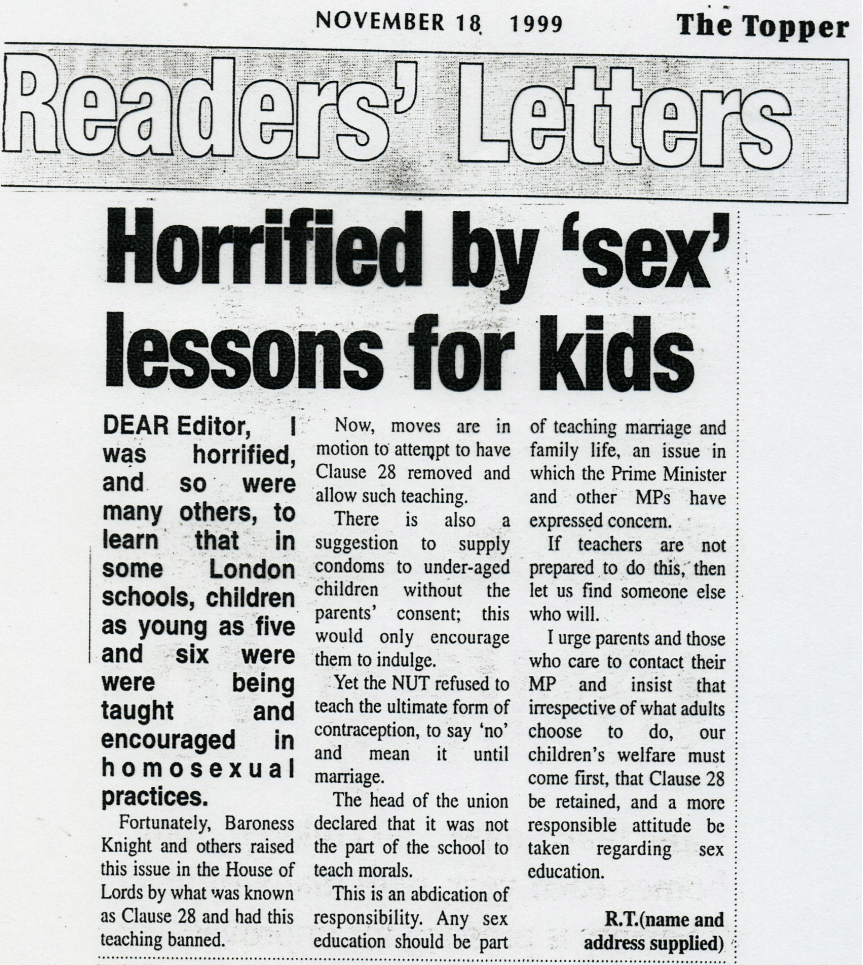
To go to the next Timeline, click HERE
